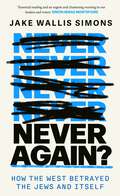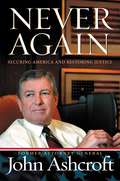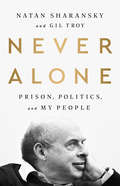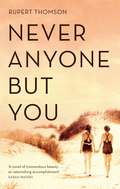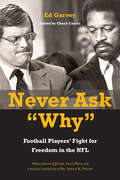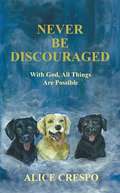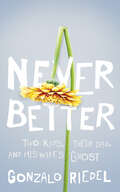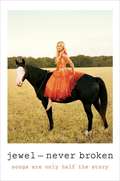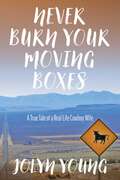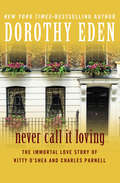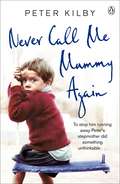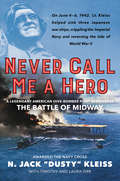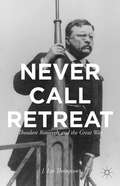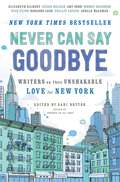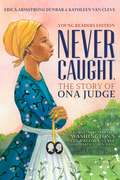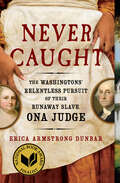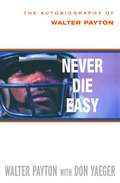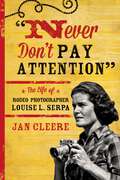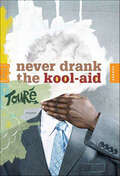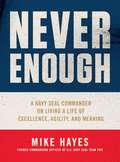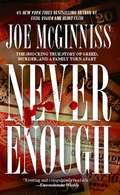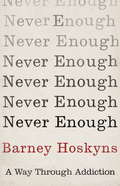- Table View
- List View
Never Again: How the West Betrayed the Jews and Itself
by Jake Wallis SimonsWhen seen through Jewish eyes, the global future looks darker than it has for generations. Fuelled by venomous Israelophobia, violence against Jews, from Amsterdam to New York, from London to Melbourne, is back. Jews across the West are forced to hide their identities, while in the supposed safe haven of Israel they live under constant threat of rocket fire, shootings and stabbings. To make matters worse, in the United States and across Europe, digitally-fuelled nationalist chauvinism is on the march. It is no exaggeration to say that we are seeing the end of the golden age of post-war safety for Jews.This speaks volumes about the health of the West. Although Jews are among the first in the firing-line, liberal democracy itself is under threat from radicals on both sides of the political spectrum. Unforgivably, we have spent decades undermining our own values of patriotism and tradition, loyalty to peoplehood and homeland, a belief in borders and our peculiar religious and cultural sensibilities. These instincts, which had anchored human society since the dawn of history, were repressed in the name of Never Again; but they slowly gave birth to the opposite.Never Again? How the West betrayed the Jews and itself is an urgent new polemic from the author of the acclaimed Israelophobia, which discloses the social and historical causes of the maze of hostility in which Jews are now trapped. Charting the development of this dangerous cultural and geopolitical moment through a collapse in Western leadership since the Second World War, the award-winning columnist, broadcaster and foreign correspondent Jake Wallis Simons offers a searing analysis of the state of the West, arguing that we must remember our older values and stand up for them before it is too late.'Essential reading and an urgent and chastening warning to our leaders and voters' SIMON SEBAG MONTEFIORE'Nobody reading this book can be left in any doubt: the fight against the latest evil upsurge in antisemitism must be won to ensure Western civilisation has a future' ANDREW NEIL'A compelling and timely call to fight for our Western values' NIGEL FARAGE'A timely diagnosis that captures the flawed mindset that is undermining the confidence of the West' KEMI BADENOCH'A brave and sane voice in a debate all too often shorn of either' ANDREW ROBERTS'A book about how to recover our confidence . . . recounted in a civil, Scrutonian and occasionally elegiac tone by a man who has lived the story he is telling' DANIEL HANNAN'An essential book for our troubling times' BERNARD HENRI LÉVY'Jake Wallis Simons is a brave and brilliant writer who can be trusted to bring rare moral clarity to the most contested issues of our times' MICHAEL GOVE'A must-read for scholars, activists and concerned citizens alike' AYAAN HIRSI ALI'I felt a whole lot better after reading this book' ALLISON PEARSON'Bang on' BORIS JOHNSON
Never Again: Securing America and Restoring Justice
by John AshcroftJohn Ashcroft's service as attorney general began with turmoil: a loss to a deceased challenger in his senate reelection campaign and a tumultuous confirmation battle. Then, on September 11, 2001, his job was transformed into the greatest leadership challenge an attorney general has ever faced. Highly classified intelligence briefings, secret surveillance of terror cells, and war councils with President Bush gave Ashcroft a uniquely comprehensive--and uniquely chilling--view of the threats to American security.In NEVER AGAIN, Ashcroft breaks his silence about historic events that transpired during his term of office--including the largest terrorist attack in U.S. history, the enactment and defense of the Patriot Act, the Robert Hanssen spy scandal, the execution of Timothy McVeigh, and the recently discovered domestic surveillance program authorized by President Bush. In this provocative book, readers will meet the man behind the title and hear his take on the dangers to and within America from outside forces, and what he did to repair the serious breaches in our country's security. NEVER AGAIN is a fascinating and probing look at what Ashcroft believes will ultimately make America safe.
Never Alone: Prison, Politics, and My People
by Gil Troy Natan SharanskyA classic account of courage, integrity, and most of all, belongingIn 1977, Natan Sharansky, a leading activist in the democratic dissident movement in the Soviet Union and the movement for free Jewish emigration, was arrested by the KGB. He spent nine years as a political prisoner, convicted of treason against the state. Every day, Sharansky fought for individual freedom in the face of overt tyranny, a struggle that would come to define the rest of his life.Never Alone reveals how Sharansky's years in prison, many spent in harsh solitary confinement, prepared him for a very public life after his release. As an Israeli politician and the head of the Jewish Agency, Sharansky brought extraordinary moral clarity and uncompromising, often uncomfortable, honesty. His storyis suffused with reflections from his time as a political prisoner, from his seat at the table as history unfolded in Israel and the Middle East, and from his passionate efforts to unite the Jewish people.Written with frankness, affection, and humor, the book offers us profound insights from a man who embraced the essential human struggle: to find his own voice, his own faith, and the people to whom he could belong.
Never Anyone But You
by Rupert Thomson'A novel of tremendous beauty . . . A wonderful achievement' Sarah Waters'A beautiful and extraordinary book' Philip PullmanWhen Suzanne, a shy 17-year-old, meets the brilliant but troubled Lucie in rural Provence at the turn of the twentieth century, the two young women embark on a clandestine love affair. But they soon long for greater freedom. The lovers move to Paris where they recreate themselves entirely, as Claude Cahun and Marcel Moore. Before long, they are mixing in the most glamorous social circles and producing art of great power and strangeness.But the world is rapidly darkening around them. With war looming they leave Paris for Jersey, and it is here that they confront their destiny, dreaming up a campaign of propaganda against Hitler's occupying forces that will put their love - and even their very existence - in jeopardy. From one of our most celebrated writers, Never Anyone but You explores the gripping true story of two extraordinary women who smashed gender boundaries and ultimately risked their lives to overcome oppression. Theirs is a story that has been hidden in the margins of history - until now...
Never Ask "Why": Football Players' Fight for Freedom in the NFL
by Ed GarveyWhen pro football players formed a union to stand up against the NFL for their own interests, they chose lawyer Ed Garvey as their Executive Director. The NFL Players Association (NFLPA), would take on the NFL over player contracts, collective bargaining agreements, and antitrust suits. It lobbied for players’ free agency, contract rights, and impartial arbitration of disciplinary disputes. Garvey navigated strikes, lockouts, scabs, stooges, lies, as well as the sports media complex—to maintain players’ dignity. According to the league, the players were to take what they were given and “never ask why.” In Never Ask “Why,” journalist Chuck Cascio presents the late Garvey’s rich account of the early years of the NFLPA, taking readers among the players as they held the league accountable to play fair. Learning from their mistakes, the NFLPA would succeed in curbing commissioner Pete Rozelle’s disciplinary power and striking down the Rozelle Rule’s absolute control over free agency. Garvey tells the intimate stories of how pro football players, rivals on the field, rallied together to stand up for themselves. He worked tirelessly to change a system that exploited players and even controlled the media. In the end, Garvey shows how the NFLPA transformed the state of pro sports leagues today and how, even still, they work to keep down the players on whose backs they profit.
Never Ask "Why": Football Players' Fight for Freedom in the NFL
by Ed GarveyWhen pro football players formed a union to stand up against the NFL for their own interests, they chose lawyer Ed Garvey as their Executive Director. The NFL Players Association (NFLPA), would take on the NFL over player contracts, collective bargaining agreements, and antitrust suits. It lobbied for players’ free agency, contract rights, and impartial arbitration of disciplinary disputes. Garvey navigated strikes, lockouts, scabs, stooges, lies, as well as the sports media complex—to maintain players’ dignity. According to the league, the players were to take what they were given and “never ask why.” In Never Ask “Why,” journalist Chuck Cascio presents the late Garvey’s rich account of the early years of the NFLPA, taking readers among the players as they held the league accountable to play fair. Learning from their mistakes, the NFLPA would succeed in curbing commissioner Pete Rozelle’s disciplinary power and striking down the Rozelle Rule’s absolute control over free agency. Garvey tells the intimate stories of how pro football players, rivals on the field, rallied together to stand up for themselves. He worked tirelessly to change a system that exploited players and even controlled the media. In the end, Garvey shows how the NFLPA transformed the state of pro sports leagues today and how, even still, they work to keep down the players on whose backs they profit.
Never Baptize Downstream (From the Summit Looking Back #2)
by Lloyd MattsonNever Baptize Downstream comes in three parts. The first part, "All the Years," tells stories promised in All the Days of My Life chronologically. The second and third parts organize stories topically, with little regard for chronology.
Never Be Discouraged: With God, All Things Are Possible
by Alice CrespoAlice Crespo was born in New York City, raised in Brooklyn, and grew up totally blind. She had to learn many things, and she realized that, with God's help, there was nothing that she couldn't do. The sky was the limit. Alice is now sixty years of age, and she wants to share her experiences and her life lessons with you. Here is her story. Contains image descriptions.
Never Better: Two Kids, Their Dad, and His Wife's Ghost
by Gonzalo RiedelHis wife died before their second son turned one. How can he keep her memory alive when there’s so much he wants to forget?There was a time before his wife got sick when Gonzalo could think about other things. They had full lives where death didn’t factor. Where humour was more than a coping mechanism. Life wasn’t all about treatments and recovery, or the emptiness he felt when she died.They had kids together. Young kids. Less than a year after their youngest was born and suddenly he was strapping them both into their car seats to drive to their mother’s funeral.He used to think he was the glue holding the household together. It didn’t take long for him to realize how wrong he’d been. A grieving husband is in no condition to raise kids alone. There were times when he wanted to toss himself into a raging river that would suck him under and bash his skull on the rocks. That’s always an option for another day. For now, he’ll just squash those feelings and drive the kids to daycare.Does it get easier? Of course. But not right away. They say that hope only comes at the end of a long dark journey, but that isn’t entirely true because the journey never really ends. But that means there’s good news: hope is everywhere you look.
Never Broken: Songs Are Only Half the Story
by JewelNew York Times bestselling poet and multi-platinum singer-songwriter Jewel explores her unconventional upbringing and extraordinary life in an inspirational memoir that covers her childhood to fame, marriage, and motherhood.When Jewel's first album, Pieces of You, topped the charts in 1995, her emotional voice and vulnerable performance were groundbreaking. Drawing comparisons to Joan Baez and Joni Mitchell, a singer-songwriter of her kind had not emerged in decades. Now, with more than thirty million albums sold worldwide, Jewel tells the story of her life, and the lessons learned from her experience and her music. Living on a homestead in Alaska, Jewel learned to yodel at age five, and joined her parents' entertainment act, working in hotels, honky-tonks, and biker bars. Behind a strong-willed family life with an emphasis on music and artistic talent, however, there was also instability, abuse, and trauma. At age fifteen, she moved out and tasked herself with a mission: to see if she could avoid being the kind of statistic that her past indicated for her future. Soon after, she was accepted to the prestigious Interlochen Arts Academy in Michigan, and there she began writing her own songs as a means of expressing herself and documenting her journey to find happiness. Jewel was eighteen and homeless in San Diego when a radio DJ aired a bootleg version of one of her songs and it was requested into the top-ten countdown, something unheard-of for an unsigned artist. By the time she was twenty-one, her debut had gone multiplatinum. There is much more to Jewel's story, though, one complicated by family legacies, by crippling fear and insecurity, and by the extraordinary circumstances in which she managed to flourish and find happiness despite these obstacles. Along her road of self-discovery, learning to redirect her fate, Jewel has become an iconic singer and songwriter. In Never Broken she reflects on how she survived, and how writing songs, poetry, and prose has saved her life many times over. She writes lyrically about the natural wonders of Alaska, about pain and loss, about the healing power of motherhood, and about discovering her own identity years after the entire world had discovered the beauty of her songs.From the Hardcover edition.
Never Burn Your Moving Boxes
by Jolyn YoungA young woman's struggle with marriage and motherhood on some of the most remote ranches in the American West.Jolyn Young grew up in the &“real&” northern California—the forgotten area at the tip-top of the state with small towns, extreme poverty, and about 40 miles to the Oregonian mountains. In a childhood defined by a subdivision, she decided she wanted to be a cowboy, and two years out of college, she saw that dream through, taking a job at a Nevada ranch in the search for a lifestyle subsisting of horses, cattle, and the wide open range.Falling in love was never part of the plan.Jim Young was tall, strong, and could ride a bronc and rope a steer like no one's business. And before she knew it Jolyn found her cowboyin' dreams overtaken by a new and intoxicating cowboy reality. With long days side by side in the saddle, nights sharing a bedroll, and the deep satisfaction that came with hard physical work in a place filled with natural beauty, it seemed life was all a strong-willed young woman might want it to be.But when a baby-to-be suddenly spun her wild romance into a very practical marriage, and one decrepit ranch trailer home led to the next, Jolyn found her young family desperately seeking stability in what is by definition a transient lifestyle that moves with the seasons. Often hours from the nearest grocery store and half-a-day from the closest hospital, pregnancy, childbirth, and illness required a do-it-yourself mentality. With days, sometimes weeks on her own as Jim worked the farthest reaches of whatever ranchlands they currently called home—and first with one child to care for—and eventually with three—Jolyn fought profound loneliness, finding comfort in writing and company in her camera.As the cowboy lifestyle pulled them further toward the brink of civilization and Jim's drinking became a liability, losing him jobs and sending them packing, again, to yet another, different, distant cow camp, Jolyn struggled with the knowledge that she was choosing a life of scrubbing filthy mobile home floors and bunkhouse bathrooms in order to keep her family together. It would take leaving it, and Jim, for her to determine whether a world built on risk could coexist with the responsible mother she had needed to become.With a memoir that is brave, honest, and heartbreakingly funny, Jolyn Young has written the story of every young adventure-seeker, every new mother, and every partner who has loved an alcoholic in a whole new light—that of a campfire, on the edge of the desert night, miles away from cell phone reception.
Never Call It Loving: The Immortal Love Story of Kitty O'Shea and Charles Parnell
by Dorothy EdenBased on a true story: A novel of an illicit love affair in nineteeth-century Ireland by the New York Times–bestselling author of The American Heiress. Katharine O&’Shea is an unhappily married young mother of three when she meets Charles Stewart Parnell, &“the uncrowned king of Ireland.&” They couldn&’t be more different. Kitty is from an aristocratic English family. Born in County Wicklow to Protestant gentry, Parnell is a passionate crusader for Ireland&’s oppressed poor. But their first encounter leaves them both with the certainty that something momentous has occurred. Before long, they&’re engaged in a forbidden liaison—one that will have profound ramifications for Kitty&’s personal life and Charles&’s brilliant political career. As their love affair plays out on the world stage, scandal and a scorned husband&’s revenge conspire to destroy everything Charles has worked to achieve for the Irish. Set against the tumultuous backdrop of late-nineteenth-century England and Ireland, Dorothy Eden&’s most ambitious novel weaves a passionate, heartbreaking story of a larger-than-life man and woman whose only crime is falling in love.
Never Call Me Mummy Again
by Peter KilbyThe heartbreaking but inspiring true story of a childhood of abuse, and finding a way out of the darkness. Peter was just a toddler when his mother tragically died after trying to abort a child they simply couldn't support. When his father swiftly replaced her with his mistress, Peter made the mistake of calling her 'Mummy'. Dragged outside, trampled on and shouted at, Peter never made that mistake again. Peter tried time and time again to flee the terrible abuse that dominated his childhood; his hands held against burning stoves, being thrown from a window and even his small feet nailed to the floorboards to prevent his running away. In Never Call Me Mummy Again, the devastating yet profoundly moving and uplifting memoir, Peter Kilby tells of how he finally escaped the stepmother from hell and started again.
Never Call Me a Hero: A Legendary American Dive-Bomber Pilot Remembers the Battle of Midway
by Laura Orr Timothy Orr N. Jack KleissHailed as "the single most effective pilot at Midway" (World War II magazine), Dusty Kleiss struck and sank three Japanese warships at the Battle of Midway, including two aircraft carriers, helping turn the tide of the Second World War. This is his extraordinary memoir. NATIONAL BESTSELLER • "AN INSTANT CLASSIC" —Dallas Morning NewsOn the morning of June 4, 1942, high above the tiny Pacific atoll of Midway, Lt. (j.g.) "Dusty" Kleiss burst out of the clouds and piloted his SBD Dauntless into a near-vertical dive aimed at the heart of Japan’s Imperial Navy, which six months earlier had ruthlessly struck Pearl Harbor. The greatest naval battle in history raged around him, its outcome hanging in the balance as the U.S. desperately searched for its first major victory of the Second World War. Then, in a matter of seconds, Dusty Kleiss’s daring 20,000-foot dive helped forever alter the war’s trajectory. Plummeting through the air at 240 knots amid blistering anti-aircraft fire, the twenty-six-year-old pilot from USS Enterprise’s elite Scouting Squadron Six fixed on an invaluable target—the aircraft carrier Kaga, one of Japan’s most important capital ships. He released three bombs at the last possible instant, then desperately pulled out of his gut-wrenching 9-g dive. As his plane leveled out just above the roiling Pacific Ocean, Dusty’s perfectly placed bombs struck the carrier’s deck, and Kaga erupted into an inferno from which it would never recover. Arriving safely back at Enterprise, Dusty was met with heartbreaking news: his best friend was missing and presumed dead along with two dozen of their fellow naval aviators. Unbowed, Dusty returned to the air that same afternoon and, remarkably, would fatally strike another enemy carrier, Hiryu. Two days later, his deadeye aim contributed to the destruction of a third Japanese warship, the cruiser Mikuma, thereby making Dusty the only pilot from either side to land hits on three different ships, all of which sank—losses that crippled the once-fearsome Japanese fleet. By battle’s end, the humble young sailor from Kansas had earned his place in history—and yet he stayed silent for decades, living quietly with his children and his wife, Jean, whom he married less than a month after Midway. Now his extraordinary and long-awaited memoir, Never Call Me a Hero, tells the Navy Cross recipient’s full story for the first time, offering an unprecedentedly intimate look at the "the decisive contest for control of the Pacific in World War II" (New York Times)—and one man’s essential role in helping secure its outcome. Dusty worked on this book for years with naval historians Timothy and Laura Orr, aiming to publish Never Call Me a Hero for Midway’s seventy-fifth anniversary in June 2017. Sadly, as the book neared completion in 2016, Dusty Kleiss passed away at age 100, one of the last surviving dive-bomber pilots to have fought at Midway. And yet the publication of Never Call Me a Hero is a cause for celebration: these pages are Dusty’s remarkable legacy, providing a riveting eyewitness account of the Battle of Midway, and an inspiring testimony to the brave men who fought, died, and shaped history during those four extraordinary days in June, seventy-five years ago.
Never Call Retreat
by J. Lee ThompsonThe first modern account of Theodore Roosevelt and the First World War, this is a tale of war and politics as well as the private story of true love and family devotion: a story as multi-faceted as TR's own personality.
Never Can Say Goodbye: Writers on Their Unshakable Love for New York
by Sari BottonFrom the editor of the celebrated anthology Goodbye to All That: Writers on Loving and Leaving New York, comes a new collection of original essays on what keeps writers tethered to New York City.The "charming" (The New York Times) first anthology Goodbye to All That--inspired by Joan Didion's classic essay about loving and leaving Manhattan--chronicled the difficulties and disappointments inherent in loving New York, while Never Can Say Goodbye is a celebration of the city that never sleeps, in the tradition of E.B. White's classic essay, "Here Is New York." Featuring contributions from such luminaries as Elizabeth Gilbert, Susan Orlean, Nick Flynn, Adelle Waldman, Phillip Lopate, Owen King, Amy Sohn, and many others, this collection of essays is a must-have for every lover of New York--regardless of whether or not you call the Big Apple home.
Never Caught, the Story of Ona Judge: George and Martha Washington's Courageous Slave Who Dared to Run Away; Young Readers Edition
by Erica Armstrong Dunbar Kathleen Van Cleve&“A brilliant work of US history.&” —School Library Journal (starred review) &“Gripping.&” —BCCB (starred review) &“Accessible…Necessary.&” —Kirkus Reviews (starred review) A School Library Journal Best Nonfiction Book of 2019! A National Book Award Finalist for Nonfiction, Never Caught is the eye-opening narrative of Ona Judge, George and Martha Washington&’s runaway slave, who risked everything for a better life—now available as a young reader&’s edition!In this incredible narrative, Erica Armstrong Dunbar reveals a fascinating and heartbreaking behind-the-scenes look at the Washingtons when they were the First Family—and an in-depth look at their slave, Ona Judge, who dared to escape from one of the nation&’s Founding Fathers. Born into a life of slavery, Ona Judge eventually grew up to be George and Martha Washington&’s &“favored&” dower slave. When she was told that she was going to be given as a wedding gift to Martha Washington&’s granddaughter, Ona made the bold and brave decision to flee to the north, where she would be a fugitive. From her childhood, to her time with the Washingtons and living in the slave quarters, to her escape to New Hampshire, Erica Armstrong Dunbar, along with Kathleen Van Cleve, shares an intimate glimpse into the life of a little-known, but powerful figure in history, and her brave journey as she fled the most powerful couple in the country.
Never Caught: The Washingtons' Relentless Pursuit of Their Runaway Slave, Ona Judge
by Erica Armstrong DunbarA startling and eye-opening look into America&’s First Family, Never Caught is the powerful story about a daring woman of &“extraordinary grit&” (The Philadelphia Inquirer). When George Washington was elected president, he reluctantly left behind his beloved Mount Vernon to serve in Philadelphia, the temporary seat of the nation&’s capital. In setting up his household he brought along nine slaves, including Ona Judge. As the President grew accustomed to Northern ways, there was one change he couldn&’t abide: Pennsylvania law required enslaved people be set free after six months of residency in the state. Rather than comply, Washington decided to circumvent the law. Every six months he sent the slaves back down south just as the clock was about to expire. Though Ona Judge lived a life of relative comfort, she was denied freedom. So, when the opportunity presented itself one clear and pleasant spring day in Philadelphia, Judge left everything she knew to escape to New England. Yet freedom would not come without its costs. At just twenty-two-years-old, Ona became the subject of an intense manhunt led by George Washington, who used his political and personal contacts to recapture his property. &“A crisp and compulsively readable feat of research and storytelling&” (USA TODAY), historian and National Book Award finalist Erica Armstrong Dunbar weaves a powerful tale and offers fascinating new scholarship on how one young woman risked everything to gain freedom from the famous founding father and most powerful man in the United States at the time.
Never Die Easy
by Don Yaeger Walter Payton"Never die easy. Why run out of bounds and die easy? Make that linebacker pay. It carries into all facets of your life. It's okay to lose, to die, but don't die without trying, without giving it your best." His legacy is towering. Walter Payton--the man they called Sweetness, for the way he ran--remains the most prolific running back in the history of the National Football League, the star of the Chicago Bears' only Super Bowl Championship, eleven times voted the most popular sports figure in Chicago's history. Off the field, he was a devoted father whose charitable foundation benefited tens of thousands of children each year, and who--faced with terminal liver disease--refused to use his celebrity to gain a preferential position for organ donation. Walter Payton was not just a football hero; he was America's hero. Never Die Easy is Walter Payton's autobiography, told from the heart. Growing up poor in Mississippi, he took up football to get girls' attention, and went on to become a Black College All-American at tiny Jackson State (during which time he was also a finalist in a Soul Train dance contest). Drafted by the Bears in 1975, he predicted that he would last only five years but went on to play thirteen extraordinary seasons, a career earning him regular acknowledgment as one of the greatest players in the history of professional football. And when his playing days were over, he approached business and charity endeavors with the same determination and success he had brought to the football field, always putting first his devotion to friends and family. His ultimate battle with illness truly proved him the champion he always had been and prompted a staggering outpouring of love and support from hundreds of thousands of friends and admirers. Written with veteran journalist and author Don Yaeger in the last weeks of Walter Payton's life, Never Die Easy presents Walter's singular voice--warm, plainspoken, funny, self-aware--along with the voices of the friends, family, teammates, and business associates who knew him best at all stages of his life, including his wife, Connie, and their children, Brittney and Jarrett; his teammate and friend Matt Suhey; former Bears head coach Mike Ditka; and many, many others. Walter made Don Yaeger promise that his book would be "inspirational and leave people with some kind of lesson . . . and make sure you spell all the words right." Never Die Easy keeps all those promises.
Never Don't Pay Attention: The Life of Rodeo Photographer Louise L. Serpa
by Jan CleereLouise Larocque Serpa often said she was born &“in the wrong place, to the wrong woman, at the wrong time.&” Born in 1925 and growing up in New York society with a mother who was never satisfied with her rather lanky, unpolished daughter, teenager Louise eventually found happiness when she spent a summer on a Wyoming dude ranch scrubbing toilets, waiting tables and wrangling cattle. Later in life, she settled in Tucson, Arizona, where her introduction to photographing rodeos came about after a friend invited her to watch his children participate in a junior rodeo competition. Using a cheap drug-store camera, Louise began photographing youngsters as they bounced and bucked on small sheep and calves, then sold the pictures to proud parents, beginning a career that would span fifty years and take her to the highest pinnacles of rodeo photography. This biography of the legendary rodeo photographer Louise Sherpa, reveals the story of a woman who made her own way in a man&’s world and who helped shaped the character of rodeo. Interviews with her contemporaries and family and photographs from her family archives add flavor to this lively portrait of a remarkable Western woman.
Never Drank the Kool-Aid: Essays
by TouréHis name is Touré--just Touré--and like many of the musicians, athletes, and celebrities he's profiled, he has affected the way that we think about culture in America. He has profiled Eminem, 50 Cent, and Alicia Keys for the cover of Rolling Stone. He's played high-stakes poker with Jay-Z and basketball with Prince and Wynton Marsalis. In Touré's world, Dale Earnhardt, Jr. sits beside Condoleezza Rice who sits beside hip-hop pioneer Tupac Shakur, and all of them are fascinating company.Never Drank the Kool-Aid is the chronicle of Touré's unparalleled journey through the American funhouse called pop culture. Its rooms are filled with creative, arrogant, kind, ordinary, and extraordinary people, most of whom happen to be famous. It is Touré's gift to be able to see through the artifice of their world and understand the genuine motivations behind their achievements--to see who they truly are as people. This is a searingly funny, surprisingly unguarded, and deeply insightful look at a world few of us comprehend.
Never Enough: A Navy SEAL Commander on Living a Life of Excellence, Agility, and Meaning
by Mike HayesIn Never Enough, Mike Hayes—former Commander of SEAL Team TWO—helps readers apply high-stakes lessons about excellence, agility, and meaning across their personal and professional lives.Mike Hayes has lived a lifetime of once-in-a-lifetime experiences. He has been held at gunpoint and threatened with execution. He’s jumped out of a building rigged to explode, helped amputate a teammate’s leg, and made countless split-second life-and-death decisions. He’s written countless emails to his family, telling them how much he loves them, just in case those were the last words of his they’d ever read. Outside of the SEALs, he’s run meetings in the White House Situation Room, negotiated international arms treaties, and developed high-impact corporate strategies.Over his many years of leadership, he has always strived to be better, to contribute more, and to put others first. That’s what makes him an effective leader, and it’s the quality that he’s identified in all of the great leaders he’s encountered. That continual striving to lift those around him has filled Mike’s life with meaning and purpose, has made him secure in the knowledge that he brings his best to everything he does, and has made him someone others can rely on.In Never Enough, Mike Hayes recounts dramatic stories and offers battle- and boardroom-tested advice that will motivate readers to do work of value, live lives of purpose, and stretch themselves to reach their highest potential.
Never Enough: A Shocking True Story of Greed, Jealousy and Murder
by Joe McginnissAt thirty-nine, Nancy Kissel had it all: glamour, gusto, garishly flaunted wealth, and the royal lifestyle of the expatriate wife. Not to mention three young children and what a friend described as "the best marriage in the universe." That marriage -- to Merrill Lynch and former Goldman Sachs investment banker Robert Kissel -- ended abruptly one November night in 2003 in the bedroom of their luxury apartment high above Hong Kong's glittering Victoria Harbour. Why? Hong Kong prosecutors, who charged Nancy with murder, said she wanted to inherit Rob's millions and start a new life with a blue-collar lover who lived in a New Hampshire trailer park. She said she'd killed in self-defense while fighting for her life against an abusive, cocaine-addicted husband who had forced her for years to submit to his brutal sexual demands. Her 2005 trial, lasting for months and rich in lurid detail, captivated Hong Kong's expatriate community and attracted attention worldwide. Less than a year after the jury of seven Chinese citizens returned its unexpected verdict, Rob's brother, Andrew, a Connecticut real estate tycoon facing prison for fraud and embezzlement, was also found dead: stabbed in the back in the basement of his multimillion-dollar Greenwich mansion by person or persons unknown. Never Enough is the harrowing true story of these two brothers, Robert and Andrew Kissel, who grew up wanting to own the world but instead wound up murdered half a world apart; and of Nancy Kissel, a riddle wrapped inside an enigma, a modern American woman for whom having it all might not have been enough. In this singularly compelling narrative, Joe McGinniss -- past master at exposing the dark heart of the American family in the bestsellers Fatal Vision, Blind Faith, and Cruel Doubt-- explores his darkest and most disturbing subject yet: a smart and beautiful family so corroded by greed that it destroys itself from within. Here is a family saga almost biblical in its tragic proportion but dazzlingly modern in flavor -- and utterly unstoppable in its pulsating narrative drive. From the shimmering skyscrapers and greed-drenched bustle of Hong Kong to the moneyed hush and hauteur of back country Greenwich, McGinniss lures readers irresistibly forward, as this twisted tale of ambition gone mad and love gone bad rushes to its terrible, inexorable conclusion.
Never Enough: A Way Through Addiction
by Barney Hoskyns'This book could save your life' John Crace'An unblinking account of living with - and more importantly, beyond - addiction. Brave, clear-eyed and inspiring' John Niven'A rich, uplifting memoir: Hoskyns portrays how painful inadequacy, masked by drugs, can be replaced by the messiness of ordinary life' Oliver JamesA few months after graduating with a 1st class honours degree from Oxford University, Barney Hoskyns sat in a damp Clapham basement and asked his best friend to inject him with heroin. From that moment on, for the next three years, Hoskyns is hopelessly hooked. This is the searingly honest story of what brought him to this place - and how he got himself out of it. Barney Hoskyns is one of the leading music writers of our time: his books have ranged the musical landscape from Led Zeppelin to Tom Waits, from Laurel Canyon to Woodstock. His articles have appeared in NME, Melody Maker, Rolling Stone and Vogue, and in 2000 he founded Rock's Backpages. Hoskyns beautifully describes the relationship between music and addiction, between love and infatuation. Never Enough is Hoskyns's raw, uncompromising and utterly compelling account of the highs and lows of life under the needle. Interspersed with photos and diary entries, Hosykns examines why he so willingly gave himself up to the death-grip of heroin, and what it took to finally free himself from it.
Never Enough: A Way Through Addiction
by Barney Hoskyns'An unblinking account of living with - and more importantly, beyond - addiction. Brave, clear-eyed and inspiring' John NivenA few months after graduating with a 1st class honours degree from Oxford University, Barney Hoskyns sat in a damp Clapham basement and asked his best friend to inject him with heroin. From that moment on, for the next three years, Hoskyns is hopelessly hooked. This is the searingly honest story of what brought him to this place - and how he got himself out of it. Barney Hoskyns is one of the leading music writers of our time: his books have ranged the musical landscape from Led Zeppelin to Tom Waits, from Laurel Canyon to Woodstock. His articles have appeared in NME, Melody Maker, Rolling Stone and Vogue, and in 2000 he founded Rock's Backpages. Hoskyns beautifully describes the relationship between music and addiction, between love and infatuation. Never Enough is Hoskyns's raw, uncompromising and utterly compelling account of the highs and lows of life under the needle. Interspersed with photos and diary entries, Hosykns examines why he so willingly gave himself up to the death-grip of heroin, and what it took to finally free himself from it.
